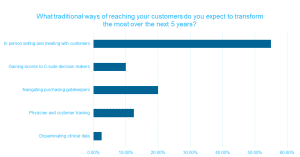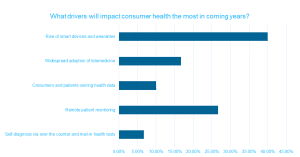MedTech FIT 2020 is a brand-new panel series that brings perspectives from sales, marketing, operations, and the C-suite together to discuss the rapidly evolving market. In our first session, Physician, Patient, and Stakeholder Solutions: Formulating Long-Term Business Plans from the Top, panelists from Medtronic, Smith & Nephew, Heraeus Medical, and Penumbra evaluated challenges and opportunities posed by changes occurring today in MedTech.
In case you missed it, we’ve got you covered with the key takeaways:
- Launching and selling medical devices will be forever changed
- Medical device companies are still launching products, but these launches look different than they did in the past. Some physicians and hospitals aren’t looking at new products at all right now. It varies from facility to facility.
- With fewer sales reps allowed in hospitals and operating rooms due to the pandemic, it’s prompting medical device companies to think differently about sales tools they provide to sales teams, it’s bringing up unique aspects of communication that they haven’t had to do in the past.
- There is more of an audience at ASCs that support simplification, standardization and packaging of products that requires less opening of boxes for a procedure.
- There is no substitute for sales reps being in the operating room during a case. It is extremely challenging to provide case support through a glass window using a speaker in the operating room.

55% of our audience poll said in-person selling and meeting with customers is the sales and marketing practice that will require the biggest transformation due to COVID-19.
- Care delivery is shifting – and MedTech has an opportunity to help shape what the future will look like
- Elective surgeries are generally not being done as much due to the pandemic in hospital settings, but the panel has seen those same procedures move into ambulatory surgery centers.
- Healthcare providers are looking more at the best location to do procedures, based on a risk assessment for the patient in the procedure. There may be ways to accelerate healthcare savings by making sure the site of service is aligned really with the technology available and the patient needs. That may mean doing more procedures in ASCs or even in office, for certain patient profiles.
- The panel all agreed many people are still wary of getting procedures done in hospitals due to the perceived risk of COVID-19. There is an opportunity for healthcare systems, providers and industry to work together to help educate people so they feel safe going to hospitals again.
- There is an opportunity to help educate patients, especially with a lot of chronic conditions. Providing them information on a just-in-time basis when and where they need it is really important. Big pharma does this well and there is an opportunity for the device world for better education directed to consumers.
- Digitization and big data are major influencers
- Understanding all of the clinical outcome and patient reported outcome data is a challenge for many organizations. Getting a handle on this will be critical to succeed in the future.
- This connected data is going to be really critical to better improving the health system, particularly for chronic illness.
- The companies that can figure out how to manage providing support to their surgeon customers virtually will be at a huge advantage. There will be a need to overcome some limitations and legalities, but it will be necessary in the pandemic world.

As the population continues to take more interest and ownership in their own personal health data, 40% of our audience identified the rise of smart devices and wearables as the biggest trend impacting consumer health in the immediate future.
